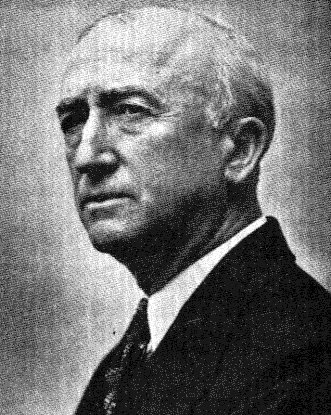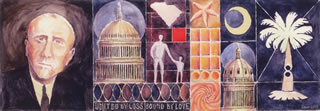Byrnes' Legislative Years
"I thought of myself in the Senate as a conservative
liberal trying to restrain the extremists of the right and left. But
being a moderate is like being a peacemaker -- you are blessed out
by both sides." James F. Byrnes

At
the age of 31, Mr. Byrnes was elected to the United States Congress.
During the fourteen years he served, he became associated with many
important people, including Speakers of the House Joe Cannon and Champ
Clark. He also worked closely with several Presidents. Woodrow Wilson consulted him often when considering legislation.
Mr. Byrnes made several important contributions while he served in
the House. One of his main interests in his earlier years was the improvement
of public roads. Later, he worked closely with Carter Glass to pass
the Federal Reserve Act. This act is still part of our banking laws.
Mr. Byrnes also served on the House Appropriations Committee, which
gave him valuable financial experience in government.
By 1924, Byrnes was faced with the decision of whether to be a candidate
for the U.S. Senate or to return to practicing law. He finally decided
to run for the Senate seat. The campaign was a tough fight, and he
lost narrowly to Senator Cole Blease, the incumbent. This was Mr. Byrnes'
only election loss during his entire political career. He left Washington
shortly afterwards to practice law in Spartanburg, S.C.
In 1930, however, Mr. Byrnes felt compelled to try for the Senate
seat once again. He won this election and thus resumed his political
career. While serving in the Senate, Mr. Byrnes played a vital role
in passing the New Deal legislation of Franklin Delano Roosevelt which
helped the country survive the Great Depression. FDR consulted Byrnes
several other times while he was in office and once even suggested
that Byrnes be nominated as his running mate during a reelection campaign.
Mr. Byrnes once said that he enjoyed his service of eleven years in
the U.S. Senate the most of all the political arenas in which he practiced.
In fact, he believed that politics had become part of his blood. It
indeed came naturally to him.





